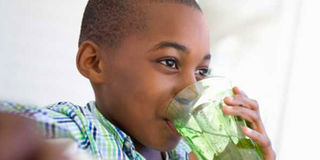Children too need water; Beware of dehydration

What you need to know:
Water. Children may not remember to drink water by themselves, yet their bodies need it to function at full capacity. This is why it is important for adults to provide ways to encourage a regular intake of fluid. Beatrice Nakibuuka explains why good hydration is paramount.
Joyce Nakato did not know what to do with her four-month-old baby who cried for a whole day. “Despite several attempts to breastfeed the baby, she continously rejected it and resorted to crying. The baby was irritable, restless and and her eyes became sunken. I did not know what to do.”
A neighbour, who is also a paediatric nurse at Mulago hospital, overheard the baby crying. She noticed that Nakato’s baby was very hungry and dehydrated. “She went to her house and brought formular milk, mixed it and fed the baby. The baby stopped crying,” Nakato recalls.
Although the baby stopped crying, her eyes remained sunken. The nurse advised me to take her to hospital where a peadiatrician revealed that the baby was dehydrated and needed a drip.
She does not remember how or why it happened but her baby got better after the drip. According to Dr Sabrina Bakeera Kitaka, a paeditrician at Mulago National Referral Hospital, it is possible for children to lose high amounts of fluids in a short time, especially due to extreme temperatures, vomiting or diarrhoea when they are sick.
She says: “Dehydration is a life threatening condition among children. Infants and young children are more likely to become dehydrated than older children or adults. This is because babies’ bodies are unable to store enough fluids.”
Signs and symptoms
Your baby is dehydrated if you are using a lesser number of diapers than before. It means they are passing out lesser urine. Other symptoms that may show that a child is dehydrated include dry, cracked lips and a parched mouth, few or no tears, sunken eyes, headaches and dizziness for older children.
Dr Kitaka says babies who are severely dehydrated have fatigue, sunken fontanels, cold and dry skin, excessive irritability, low energy levels and are constantly restless.
Causes
She says: “If your baby is unwell and has fever, diarrhoea or vomiting, it could be the reason for dehydration. Fever also can cause dehydration among children because they often oversweat.”
If your child has reduced intake of fluids maybe because they are unwell, they are likely to suffer from dehydration.
Replacing the fluids
When they are born, babies get much of their fluid content from breast milk, until they are six months old. When they cross this threshold, their activity increases and in addition to the semi solid food, they should be given fluids, especially water to increase their fluid intake.
Remember to give your child enough plain water. However, remember not to add honey or any artificial sweeteners to baby juices until they make a year.
The primary aim of treating dehydration should be a quick replacement of depleted fluid levels in the body and restoring them to normal levels.
Dr Kitaka says: “Oral Rehydration Solution, a combination of salt and sugar is very ideal for both babies and toddlers who are dehydrated in order to help restore the lost fluids and salts, especially if the child had diarrhoea.
If the child is not able to drink, then the fluids can be replaced using intravenous fluids.”




